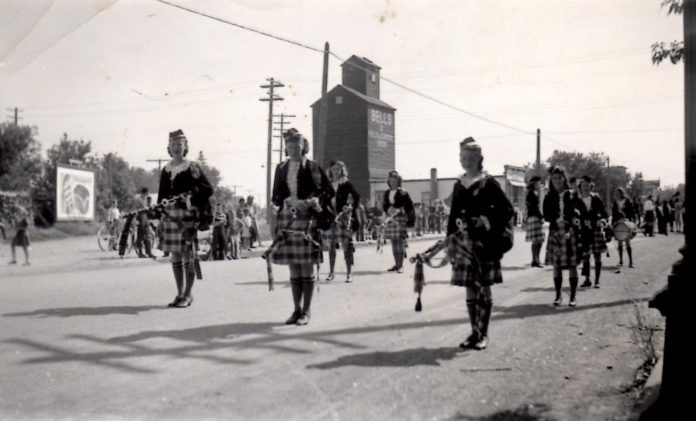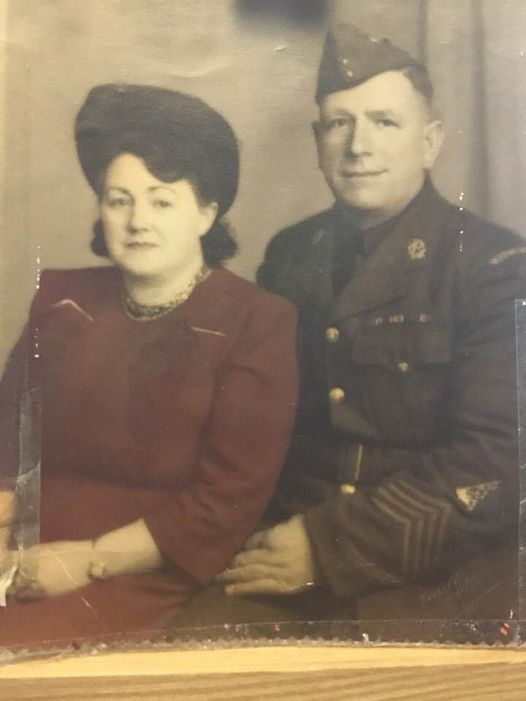
Ye Pow’rs, wha mak mankind your care,
And dish them out their bill o’ fare,
Auld Scotland wants nae skinking ware
That jaups in luggies;
But if ye wish her gratefu’ prayer,
Gie her a Haggis!
Robbie Burns Day. A tune or two on the bag-pipes. A wee dram, or two. The haggis cut and served once more.
It is likely that James Mowat Forrest was amongst the most Scottish of all the Scots who walked the streets of Prince Albert. Born Apr. 2, 1892, in Keith, Scotland, he came to live in the Prince Albert area in October, 1934. Forrest became entrenched in the community, and he left a large void in our community when he died on Sept. 1, 1975 at the age of 83.
Growing up in his home community of Keith, the second of twelve children, Forrest was never a good student. He left school at the age of eleven, having attained no higher an education than grade three. Ever a leader even at that early age, the staff of the school considered that when there was ever mischief to be done, “Jimmy” would be at the centre of it. The school, they felt, would certainly function better without him.
Given the size of his family, and the need to earn money, young Jimmy would spend the next five years working on farms near his home. Then, at the age of sixteen, he emigrated to Australia, where once again he worked as a farm labourer, while attending night school in order to earn his grade ten.
Learning from relatives who had come to Canada that a 160 acre homestead could be bought in southern Saskatchewan for $10.00, Forrest left Australia for New Zealand, traveling and working there and then in Fiji, and then moved on to Hawaii, prior to reaching Vancouver in 1912. He worked his way to Mankota, Saskatchewan, where he filed for a homestead.
As a result of the need to earn money to make the necessary improvements to his homestead, Forrest went to work for a man in Strongfield, undertaking the necessary improvements to his newly acquired property as his cash and time allowed.
In 1914, at the outbreak of the First World War, Forrest returned to Scotland, where he joined the Gordon Highlanders, with whom he remained until the end of the conflict. While still in Scotland, Forrest married a fellow native of Keith, Agnes (Nettie) Bell. They subsequently came to Canada and settled on the homestead in Mankota.
The early years were good years for the Forrest family, which now included five children. But the “crash” of 1929, and the subsequent drought years of the early 1930s resulted in their move north.
In October, 1934, the family, now with six children, packed up and traveled to the community of Cloverdale, where Jimmy had rented the Bachelor farm. By 1935, Forrest was able to buy his own farm through the Soldiers’ Settlement Board. This time, the family moved to Wheatley, a community about three miles west of Spruce Home. The Forrests remained on the farm until 1939, when they moved into a rented property in Prince Albert.
In 1940, during the Second World War, Forrest joined the Veterans’ Home Guard of Canada. He was assigned to guarding German prisoners-of-war in camps located in various places in Ontario and Alberta.
Upon being discharged from the army in 1945, Forrest joined the staff of the Prince Albert Jail. Buying a home on the corner of First Avenue East and 27th Street, which was near his place of work, Jimmy and Nettie became active in many community activities.
First employed at the Jail as a guard, Forrest was promoted in 1947 to the position of gardener, in which capacity he remained for the remainder of his career. Even after his retirement, Forrest was re-hired each spring for several years in order that he could put in the Jail’s garden. The gardens for which Forrest was responsible included vegetable gardens, as well as the multitude of flowers which adorned the front of the Jail along 28th Street between Central and First Avenues West.
Although known and respected for his gardening skills, Forrest was also noted for his ability on the bag-pipes. During World War I, he was a piper for the Gordon Highlanders. Later, when living in Mankota, he taught a few pupils to play, and the pipe band played at picnics and events around the district.
Later, when living north of Prince Albert, Forrest was contacted by some individuals who wanted him to start a girls’ pipe band. They practised in the fire hall, and played mostly at local civic events, as well as occasionally in outlying communities. Perhaps the greatest moment for the girls and their instructor was in 1939 when they were asked to play for King George VI and Queen Elizabeth.
Forrest taught the local band until 1940, when he joined the Veterans’ Guard of Canada. While serving with them, he was once again called upon to organise a pipe band, this time within the 28th Company. The band headed many parades for a variety of army functions, but also played for non-military functions, including for efforts promoting the sale of Victory bonds.
After his discharge from the army, Forrest continued to play the bag-pipes, mostly for Legion events and, of course, at the Robbie Burns festivities.
Burns was, for Forrest, a hero. He enjoyed Burns’ poetry, and in turn he wrote his own poetry. A number of his poems were gathered in a collection entitled “Rhymes of the Wandering Piper”. Included in this collection are “A Nicht Wi’ Burns”, a poem which was also published in The Western Producer.
In a Western Producer article, Mark Inch wrote about “A Nicht Wi’ Burns” that “in our estimation it’s one of the best we’ve seen.” And in Jim Aitken’s opinion “Jim’s work was up close to Robbie’s own high standard”.
Having met Jimmy Forrest through his poetry, having read about his life, I will always think of him whenever Jan. 25 rolls around.

James and Agnes Forrest pose for a photo. James Forrest was known and respected around Prince Albert for his gardening skills, and his ability on the bag-pipes.
The first week of February is Archives Week. The Historical Society will be commemorating the week with an event on Saturday, Feb. 4 when, at 2:00 p.m., volunteers from the Bill Smiley Archives will be conducting a tour of the archives and telling stories about some of the interesting (and more mundane) activities which they perform. Anyone interested in archival work, or in the history of Prince Albert, is welcome to attend.
fgpayton@sasktel.net

